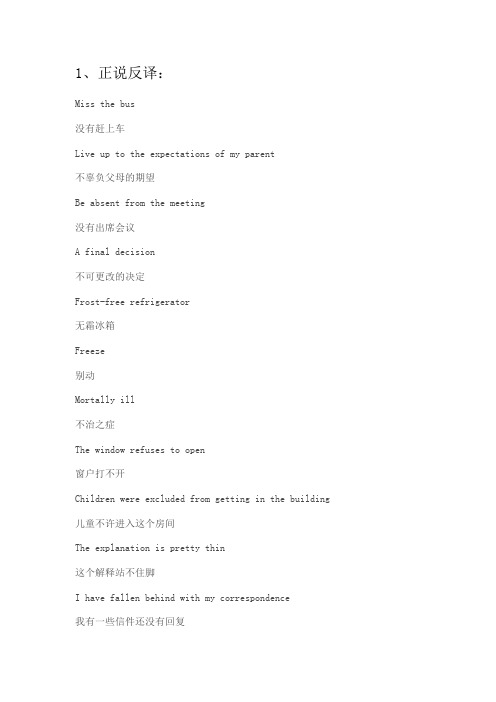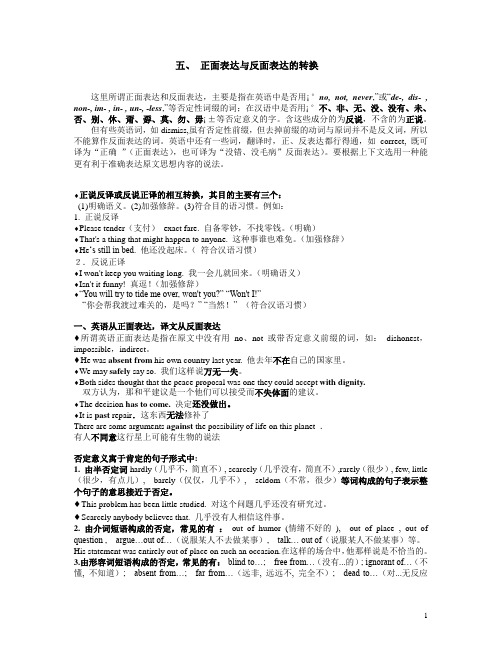正译和反译
专升本翻译讲解

创作编号:BG7531400019813488897SX创作者:别如克*专升本英语翻译讲解一、把握和理解句子结构1. What can be done has been done.正译:能做的事情都已做了。
2. Having been given sucha good chance, how could she let it get away?正译:人家给了她这样一个好机会,她怎么能轻易放过?3. The police forced the way into the room, only to find the safe empty.正译:警察破门而入,结果发现保险箱已被洗劫一空。
4. It is impolite not return telephone calls—regardless of whom they are from.正译:不回电话是不礼貌的,不管电话是谁打来的。
5. The increase in international business has created a need for managers with skills in cross-culture communication.正译:国际贸易的增加需要具有跨国文化交流技能的经理。
6. Learning how to use the Internet effectively as a marketing tool means that you need to learn towdifferent but related bodies of language.创作编号:BG7531400019813488897SX创作者:别如克*正译:学习有效地使用因特网作为营销工具,意味着要学习两类互不相同却互相关联的知识。
7. I could not but admit that it was a wise decision.正译:我不得不承认那是个明智的决定。
正说反译

1、正说反译:Miss the bus没有赶上车Live up to the expectations of my parent不辜负父母的期望Be absent from the meeting没有出席会议A final decision不可更改的决定Frost-free refrigerator无霜冰箱Freeze别动Mortally ill不治之症The window refuses to open窗户打不开Children were excluded from getting in the building 儿童不许进入这个房间The explanation is pretty thin这个解释站不住脚I have fallen behind with my correspondence我有一些信件还没有回复Fully clothes, he fell across his bunk and was instantly sleep 衣服也不脱,他往床上横着一倒,不一会儿就睡着了Don’t lose time in posting this letter不要忘了寄这封信No deposit will be refunded unless ticket produced凭票退押金例1:原文:她忍住了没有笑出声。
译文:She refrained from laughing.例2:原文:花园根本无人整理。
译文:The garden was in a state of total neglect.例3:原文:我不能忍受你的脾气。
译文:Your temper is more than I can bear.例4:原文:他宁死不屈。
译文:He would die before yielding.例5:原文:生活远非净是乐事。
译文:Life is far from being a bed of roses.例6:原文:风景美得无以言表。
正译与反译

表示否定的副词或副词短语: 表示否定的副词或副词短语: little, otherwise, too…to.. etc. 1. 显然他有不同的想法。 显然他有不同的想法。 He evidently thinks otherwise. 2. 他兴奋得说不出话来了。 他兴奋得说不出话来了。 He was too excited to speak.
反说法: 反译法 / 反说法: 用英语形式上否定的英语词表达汉语肯定的意义。 用英语形式上否定的英语词表达汉语肯定的意义。 1. 他这学期全勤。 他这学期全勤。 He has never missed a class this semester. 2. 开卷有益。 开卷有益。 One cannot read a book without leaning something. Reading is always beneficial 3. 我对你感激万分。 我对你感激万分。 I couldn’t thank you enough.
2011-12-31 4
表示否定的形容词或形容词短语: 表示否定的形容词或形容词短语:few, little, free from, far from, safe from, short of etc. 1. 他的作文中几乎没有语法错误。 他的作文中几乎没有语法错误。 There are few grammatical mistakes in his composition. 2. 那家伙极不诚实。 那家伙极不诚实。 That fellow is far from being honest. 3. 欲速则不达。 欲速则不达。 More haste, less speed. Haste makes waste. Haste brings no success. 2011-12-31 5
短句翻译中的正译与反译技巧

短句翻译中的正译与反译技巧作者:邵婷王秀峰来源:《校园英语·下旬》2018年第05期【摘要】正译和反译是译者应熟练掌握的两种常见翻译技巧。
短句是指字数简短,语言逻辑简单的句子,在短句翻译中,最常用到的翻译技巧就是正译与反译。
本文通过对比分析短句翻译中的正译与反译,从具体实例中分析了这两种翻译技巧在不同场合下的使用情况,以期帮助翻译人员更灵活的处理短句翻译。
【关键词】短句翻译;正译;反译;翻译技巧一、引言“正译”一词,最早出现于清朝魏象乾的《繙清说》一书中。
书中提出了“正译”的翻译标准,并针对翻译技巧提出具体要求。
书中写到,译者要做到“不增不减,不颠不倒,不恃取意”。
这里的正译可以理解为在翻译原文本时,尽量不任意的增加删减,颠倒顺序,改动原意。
正译是指把句子按照与源语相同的语序或表达方式进行翻译。
翻译时如果难以采用正译法,或因英汉两种语言习惯不同,需要加强修辞效果,更确切地表达原文的含义时,译者可以考虑用反面表达,或将原文的反面表达改用正面表达,使译文更流畅。
在翻译短句的过程中,原文从正面表达,译文有时可以从反面表达,这种翻译方法称为“正说反译法”;而原文从反面表达时译文可以从正面表达这种翻译方法称为“反说正译”。
这两种翻译方式统称为反译法。
反译法是指将语句按照和原来句子顺序相反的次序重新排列。
本文通过分析短句,探讨在翻译实践中怎样巧妙运用正译和反译,使译文表达更贴切,读者更易理解。
二、短句翻译中的正译无论在英译汉还是汉译英中,正译都是一种比较简单的翻译技巧,尤其在短句中,正译只需按原文的行文逻辑进行翻译,无需改动原文逻辑顺序或将肯定词更换为否定词。
1.英译汉中的正译。
例1:He gave me an indefinite answer. 他给了我一个不清楚的答复。
例2:The doubt was still unsolved. 疑团仍然未解决。
例3:Do you know why she is trying to avoid you?你知道她为什么躲着你吗?2.汉译英中的正译。
正译反译

五、正面表达与反面表达的转换这里所谓正面表达和反面表达,主要是指在英语中是否用¡°no, not, never,”或“de-, dis- , non-, im- , in- , un-, -less,”等否定性词缀的词;在汉语中是否用¡°不、非、无、没、没有、未、否、别、休、甭、孬、莫、勿、毋¡±等否定意义的字。
含这些成分的为反说,不含的为正说。
但有些英语词,如dismiss,虽有否定性前缀,但去掉前缀的动词与原词并不是反义词,所以不能算作反面表达的词。
英语中还有一些词,翻译时,正、反表达都行得通,如correct, 既可译为“正确”(正面表达),也可译为“没错、没毛病”反面表达)。
要根据上下文选用一种能更有利于准确表达原文思想内容的说法。
♦正说反译或反说正译的相互转换,其目的主要有三个:(1)明确语义。
(2)加强修辞。
(3)符合目的语习惯。
例如:1. 正说反译♦Please tender(支付)exact fare. 自备零钞,不找零钱。
(明确)♦That's a thing that might happen to anyone. 这种事谁也难免。
(加强修辞)♦He…s still in bed. 他还没起床。
(符合汉语习惯)2.反说正译♦I won't keep you waiting long. 我一会儿就回来。
(明确语义)♦Isn't it funny! 真逗!(加强修辞)♦“You will try to tide me over, won't you?” “Won't I!”“你会帮我渡过难关的,是吗?” “当然!” (符合汉语习惯)一、英语从正面表达,译文从反面表达♦所谓英语正面表达是指在原文中没有用no、not或带否定意义前缀的词,如:dishonest,impossible,indirect。
句子翻译正说反译反说正译

proposal with dignity.
正说反译
(一)汉、英两种语言的表达习惯不 同。
• 我很快就可以回老家了。
• It will not be long before I go back to my hometown.
(二)语气的需要。 • 有失才有得。
• You can’t make an omelet without breaking eggs.
正说与反说
• 但是由于汉英两种语言表达习惯 不同,在很多情况下会出现正说 反译,反说正译的情况。
• 我完全同意。 • I can't agree with you more. • 你们大错特错了。 • You couldn't be more mistaken.
正说与反说
• 油漆未干! • Wet paint! • 不好意思! • I‘m sorry. • 外表往往是靠不住的。 • Appearances are often deceptive. • 美国不失体面地接受了这项和平方案。 • The U.S.A accepted the peace
他上火车站去接他的朋友,可是未 能在人群中见到他。
He went to the station to meet his friend, but he missed him in the crowd.
与翻译有关的那些--反译法

The window refuses to open. 窗户打不开。
正说反译法(动词)
She was refused admittance by them. 他们不许她进去。 Permission to enter was denied. 不准入内。 I was denied the chance of going to university. 我没有得到上大学的机会。
Her abstraction was not because of the tea party. • 她那心不在焉的神情,并不是因为茶话会。
His hesitation led to his failure. • 他不果断/犹豫不决导致了他的失败。
正说反译法(虚词:介词)
To do this is beyond my ability. 干这事我力不胜任。 It was beyond his power to do so. 他无权这样做。
正说反译法(虚词:连词)
The soldiers would fight to death before they surrender. 战士们宁可战斗到死,而决不投降。
I will not go unless I hear from him. 如果他不通知我,我就不去。
正说反译法(虚词:连词)
What you’ve said is above me. 你所说的我不懂。
正说反译法(虚词:介词)
It seems against nature. 这似乎不符合自然规律。
He is above meanness and deceit. 他不至于做卑鄙和欺骗人的事情。
英文翻译常用技巧大全

英汉两种语言在句法、词汇、修辞等方面均存在着很大的差异,因此在进行英汉互译时必然会遇到很多困难,需要有一定的翻译技巧作指导。
常用的翻译技巧有增译法、省译法、转换法、拆句法、合并法、正译法、反译法、倒置法、包孕法、插入法、重组法和综合法等。
这些技巧不但可以运用于笔译之中,也可以运用于口译过程中,而且应该用得更加熟练,因为口译工作的特点决定了译员没有更多的时间进行思考。
1.增译法:指根据英汉两种语言不同的思维方式、语言习惯和表达方式,在翻译时增添一些词、短句或句子,以便更准确地表达出原文所包含的意义。
这种方式多半用在汉译英里。
汉语无主句较多,而英语句子一般都要有主语,所以在翻译汉语无主句的时候,除了少数可用英语无主句、被动语态或"There be…"结构来翻译以外,一般都要根据语境补出主语,使句子完整。
英汉两种语言在名词、代词、连词、介词和冠词的使用方法上也存在很大差别。
英语中代词使用频率较高,凡说到人的器官和归某人所有的或与某人有关的事物时,必须在前面加上物主代词。
因此,在汉译英时需要增补物主代词,而在英译汉时又需要根据情况适当地删减。
英语词与词、词组与词组以及句子与句子的逻辑关系一般用连词来表示,而汉语则往往通过上下文和语序来表示这种关系。
因此,在汉译英时常常需要增补连词。
英语句子离不开介词和冠词。
另外,在汉译英时还要注意增补一些原文中暗含而没有明言的词语和一些概括性、注释性的词语,以确保译文意思的完整。
总之,通过增译,一是保证译文语法结构的完整,二是保证译文意思的明确。
如:(1)What about calling him right away?马上给他打个电话,你觉得如何?(增译主语和谓语)(2)If only I could see the realization of the four modernizations.要是我能看到四个现代化实现该有多好啊!(增译主句)(3) Indeed, the reverse is true实际情况恰好相反。
- 1、下载文档前请自行甄别文档内容的完整性,平台不提供额外的编辑、内容补充、找答案等附加服务。
- 2、"仅部分预览"的文档,不可在线预览部分如存在完整性等问题,可反馈申请退款(可完整预览的文档不适用该条件!)。
- 3、如文档侵犯您的权益,请联系客服反馈,我们会尽快为您处理(人工客服工作时间:9:00-18:30)。
1. Affirmative in English, but Negative in ChineseSuch cases are found in a wide range of expressions:words of different parts of speech, various phrases, or sentence structures.●Such a chance was denied(to)me.(v.)我没有得到这样一个机会。
●Time is what we want most,but what,alas,many use worst.(adv.)时间是我们最缺少的,但可叹之至,偏偏许多人最不善于利用。
●I have read your article. I expect to meet an older man.(adj.)拜读了你的大作,没想到你这样年轻。
●It was beyond his power to sign such a contract. (prep.) 他无权签订这种合同。
●The guerrillas would rather fight to death before they surrendered.(cons.)游击队员们宁愿战斗到死也决不投降。
●They feel great anxiety about his sickness.(n.)他们对他的病情感到焦虑不安。
●The lecturer spoke above the heads of his audience.(preposition)讲演者讲得太深奥,听众听不懂。
●I'm at my wit's end to keep this child quiet.(phrase)我实在是没办法让这孩子安静下来。
●The mother said she would let off her son washing the dishes if he could finish his assignment before supper.(pie)母亲说,如果儿子晚饭前能做完作业,就不让他刷碗了。
●If it worked once, it can work twice.(sentence)一次得手,再次不愁。
2. Negative in English, but Affirmative in ChineseThis is just opposite to the previous case.●The doubt was still unsolved after his repeated explanation.(v.)虽经他一再解释,疑团仍然存在。
●He carelessly glanced through the note and got away.(adv.)他马马虎虎地看了看那张便条就走了。
●All the articles are untouchable in the museum.(adj.)博物馆内一切展品禁止触摸。
●Some people can eat what they like and get no fatter. 有些人爱吃什么就吃什么,照样瘦。
●He manifested a strong dislike for his father's business.(n.)他对他父亲的行业表示强烈的厌恶情绪。
●Don't lose time in posting this letter.(phrase)赶快把这封信寄出去。
●Such flight couldn't long escape notice.(sentence)这类飞行迟早总会被人发觉的。
3. Same English Word, with Either Affirmative or Negative Equivalents in Chinese● I'm new to the w ork. 这工作我是生手。
(这工作我不熟悉。
)● He is free with his money. 他花钱大手大脚。
(他花钱从不吝啬。
)● He realized that he was in trouble. 他意识到遇到麻烦了。
(他感到自己的处境不妙。
)● The station is no dist ance at all. 车站近在咫尺。
(车站一点儿也不远。
)● It's no less than a fraud. 这简直是一场骗局。
(这无异于一场骗局。
)● The w orks of art were left intact, the money gone. 艺术品还在,钱却不冀而飞。
(艺术品原封未动,钱却不翼而飞。
)● The criminal is still at large. 罪犯还未捉拿归案。
(罪犯仍旧逍遥法外。
)4. Double Negativ e for EmphasisDouble negative in English,as in Chinese,is used for emphasis. In this case we may either drop both the negativ e w ords or keep to the original,depending on which version is idiomatic in Chinese.● There is no rule that has no exception. 任何规则都有例外。
● There is not any advantage without disadvantage. 有一利必有一弊。
● It nev er rains but it pours. 不雨则已,雨必倾盆。
● It is impossible but that a man w ill make some mistakes. 人不会不犯错误。
● I am not reluctant to accept your proposal. 你的建议我愿意接受。
● Its significance and importance can never be overemphasized. 它的意义和重要性,不管怎样强调,也不算过分。
● Hardly a month goes by w ithout w ord of another survey revealing new depths of scientific illiteracy among U. S. citizens. 美国公民科学知识匮乏的现象日益严重,这种调查报告几乎月月都有。
5. Roundabout AffirmativeThis is an indirect way of expressing a strong affirmative,and w hen translated into Chinese, the emotion of the original should be properly kept.● He didn't half like the girl. 他非常喜欢那姑娘。
● I couldn't feel better. 我觉得身体好极了。
● I couldn't agree w ith you more. 我太赞成你的看法了。
● If that isn't w hat I want!我所要的就是这个呀!● He can't see you quick enough. 他很想尽快和你见面。
6. Some Traps in Negativ e StructuresIn the practice of translation,we may find now and then that some negative structures c-an hardly be rendered into Chinese literally,and sometimes even their original meaning could be elusive. This is w here we are liable to make blunders. The following are some typical patterns that call for attention.1)not... because● The engine did n't stop because the fuel was finished. 引擎并不是因为燃料耗尽而停止运转。
● Do n't scamp your w ork because you are pressed for time. 不要因为时间紧而敷衍塞责。
● In that city,we had never suffered discrimination because we were Jews. 我们在那个城市从未因为是犹太人而遭受歧视。
● This version is not placed first because it is simple. 此方案并不因为简易而放在首位。
2) cannot...too● The importance of this conference cannot be over estimated. 这次会议的重要性无论怎么强调也不过分。
● I shall never be able to stress too much for your kindness. 不管我怎么感谢你,都不足以报恩于万一。
● You cannot be too careful in proofreading. 校对时,越仔细越好。
3) all/every...not● All that glitters is not gold. 发光的不一定都是金子。
● All cities did not look like as they do today. 在过去,城市面貌并不都像今天这样千篇一律。
● No,everything is not straightened out. 不,并非每一个问题都弄清楚了。
4) both... not● But you see, we both cannot go. 但是我告诉你,我们俩不能同时都走。
● Both the instruments are not precision ones. 这两件东西不都是精密仪器。
